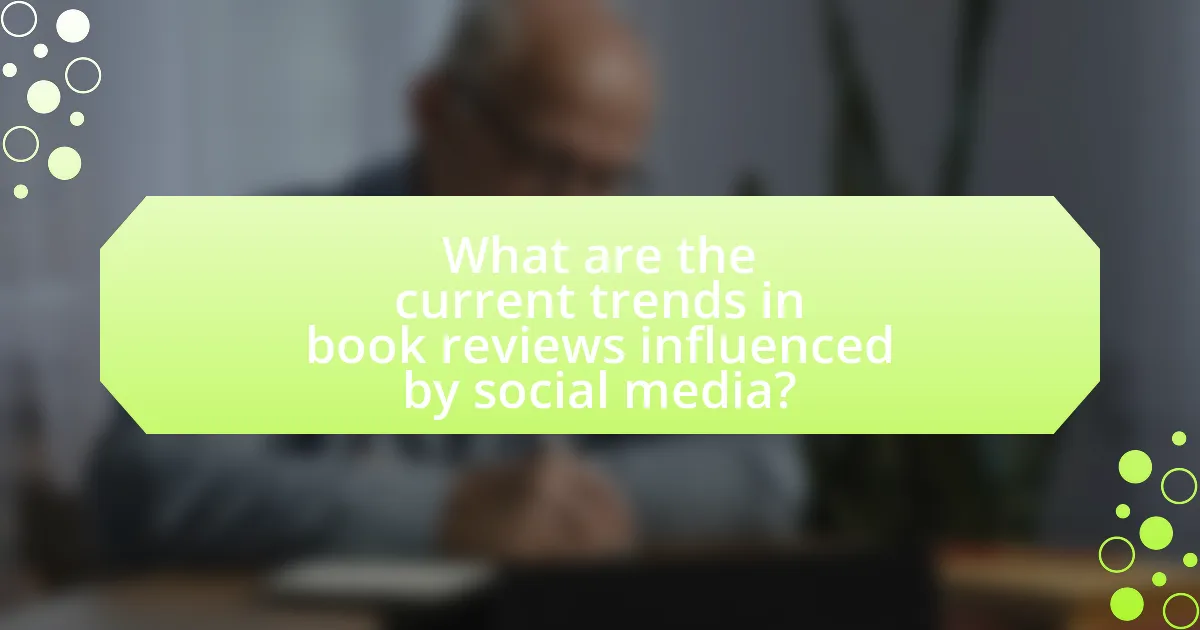The article focuses on the evolving landscape of book reviews, particularly influenced by social media and the rise of influencers. It highlights current trends such as the popularity of visual content, the impact of hashtags like #BookTok, and the role of platforms like Instagram, Goodreads, and YouTube in shaping reader engagement. The article also examines how influencers select books for review, the significance of audience preferences, and the implications of technological advancements, including AI and immersive experiences, on the future of book reviews. Additionally, it discusses strategies for authors and publishers to effectively navigate this changing environment, emphasizing the importance of authenticity and engagement in the review process.

What are the current trends in book reviews influenced by social media?
Current trends in book reviews influenced by social media include the rise of visual content, such as video reviews on platforms like TikTok and Instagram, which engage audiences more effectively than traditional text-based reviews. Additionally, the use of hashtags and challenges, such as #BookTok, has created communities that amplify book visibility and reader engagement. According to a 2021 survey by Book Riot, 70% of readers reported discovering new books through social media, highlighting its significant impact on book marketing and review dissemination.
How are influencers shaping the landscape of book reviews?
Influencers are significantly shaping the landscape of book reviews by leveraging their large followings on social media platforms to promote books and authors. This shift has led to increased visibility for both new and established titles, as influencers often provide authentic, relatable reviews that resonate with their audience. According to a 2021 survey by Book Riot, 70% of readers reported discovering books through social media influencers, highlighting their impact on consumer choices. Additionally, influencers often engage in interactive content, such as live discussions and Q&A sessions, which fosters a community around reading and encourages more diverse voices in book discussions.
What platforms are most popular for book reviews among influencers?
The most popular platforms for book reviews among influencers are Instagram, Goodreads, and YouTube. Instagram is favored for its visual appeal, allowing influencers to share aesthetically pleasing posts and stories about books. Goodreads serves as a dedicated platform for readers to rate, review, and discuss books, making it a go-to for book influencers. YouTube, with its video format, enables influencers to create engaging content such as book hauls and reviews, attracting a wide audience. These platforms collectively cater to the diverse preferences of both influencers and their followers, facilitating effective book promotion and discussion.
How do influencers choose which books to review?
Influencers choose which books to review based on factors such as audience interests, personal preferences, and publisher outreach. They often analyze trending genres and popular titles within their niche to align their content with what their followers are likely to engage with. Additionally, influencers may receive advanced reader copies from publishers, which can influence their selection process. Research indicates that 70% of book influencers prioritize books that resonate with their established brand and audience demographics, ensuring that their reviews maintain authenticity and relevance.
What role do reader preferences play in the evolution of book reviews?
Reader preferences significantly influence the evolution of book reviews by shaping the content, style, and platforms used for reviews. As readers increasingly seek personalized and relatable content, reviewers adapt their approaches to include more subjective opinions and diverse formats, such as video and social media posts. This shift is evidenced by the rise of platforms like Goodreads and BookTok, where user-generated content reflects individual tastes and encourages community engagement. Consequently, traditional review formats are evolving to meet the demand for authenticity and connection, demonstrating that reader preferences are a driving force in the transformation of book reviews.
How are audience engagement metrics influencing review styles?
Audience engagement metrics are significantly influencing review styles by prompting reviewers to tailor their content to maximize reader interaction. Reviewers are increasingly focusing on concise, engaging formats that encourage comments, shares, and likes, as evidenced by the rise of video reviews and social media snippets. For instance, platforms like Instagram and TikTok have popularized short, visually appealing reviews that prioritize entertainment value alongside informative content, reflecting the preferences of their audience. This shift is supported by data indicating that posts with higher engagement rates often feature dynamic, relatable styles, leading to a transformation in how reviews are crafted and presented.
What types of content are readers most drawn to in book reviews?
Readers are most drawn to content in book reviews that includes personal insights, emotional reactions, and specific examples from the text. Personal insights allow readers to connect with the reviewer’s perspective, while emotional reactions help convey the book’s impact. Specific examples, such as quotes or plot summaries, provide context and help readers gauge their interest. Research indicates that reviews featuring these elements tend to receive higher engagement, as they resonate more with potential readers looking for relatable and informative content.

What predictions can be made about the future of book reviews?
The future of book reviews is likely to see an increase in multimedia formats and personalized recommendations. As technology advances, platforms will integrate video reviews and interactive content, enhancing user engagement. Additionally, algorithms will increasingly tailor book suggestions based on individual reading habits and preferences, making reviews more relevant. This shift is supported by the growing popularity of platforms like YouTube and TikTok, where visual content dominates, indicating a trend towards more dynamic review formats.
How might technology change the way book reviews are created and consumed?
Technology will significantly alter the creation and consumption of book reviews by enabling faster, more interactive, and personalized experiences. Digital platforms allow authors, publishers, and readers to share reviews instantly, utilizing social media and blogs to reach wider audiences. For instance, platforms like Goodreads and Amazon facilitate user-generated content, where readers can post reviews and ratings immediately after reading, influencing potential buyers in real-time. Additionally, advancements in artificial intelligence can tailor recommendations based on user preferences, enhancing the relevance of reviews. Data from a 2021 survey by the Pew Research Center indicates that 79% of Americans have read a book in some format, highlighting the growing importance of accessible and engaging review formats in the digital age.
What impact will AI have on book review generation?
AI will significantly enhance book review generation by automating the analysis of text and synthesizing insights. This technology can quickly process large volumes of content, identifying key themes, character developments, and stylistic elements, which allows for the creation of comprehensive reviews in a fraction of the time it would take a human. For instance, AI algorithms can analyze reader sentiment and preferences, tailoring reviews to specific audiences, thereby increasing engagement. Studies have shown that AI-generated content can match or even exceed human quality in certain contexts, as evidenced by advancements in natural language processing models like GPT-3, which can produce coherent and contextually relevant text.
How will virtual reality and augmented reality influence book reviews?
Virtual reality (VR) and augmented reality (AR) will significantly enhance book reviews by providing immersive experiences that allow readers to engage with content in innovative ways. These technologies can create interactive environments where users can explore settings, characters, and themes of a book, leading to a deeper understanding and emotional connection with the material. For instance, a VR experience could allow readers to step into a novel’s world, while AR could overlay additional information or visuals onto physical books, enriching the reading experience. Studies indicate that immersive experiences can improve retention and engagement, suggesting that VR and AR will transform traditional book reviews into multi-sensory experiences that attract a wider audience.
What shifts in consumer behavior are expected in the coming years?
Shifts in consumer behavior expected in the coming years include an increased reliance on digital platforms for book reviews and recommendations. As more consumers turn to social media and influencer platforms for guidance, traditional review sources are likely to decline in influence. According to a 2022 survey by the Pew Research Center, 45% of adults reported using social media to discover new books, indicating a significant trend towards digital engagement. Additionally, consumers are expected to prioritize authenticity and relatability in reviews, favoring influencers who share personal experiences over generic critiques. This shift reflects a broader trend towards valuing peer recommendations and personalized content in purchasing decisions.
How will the rise of audiobooks affect traditional book reviews?
The rise of audiobooks will likely lead to a shift in traditional book reviews by expanding the scope of what is reviewed and how reviews are presented. As audiobooks gain popularity, reviewers may increasingly focus on the narration quality, production values, and listener engagement, alongside the content of the book itself. This shift is supported by data indicating that audiobook sales have surged, with a reported growth of 25% in 2020 alone, according to the Audio Publishers Association. Consequently, traditional book reviews may evolve to incorporate more multimedia elements, such as audio snippets or video reviews, to cater to the preferences of audiobook listeners.
What trends in self-publishing might influence book review practices?
The rise of self-publishing is significantly influencing book review practices by increasing the volume of available titles and diversifying the types of authors. Self-published authors often rely on peer reviews and social media for visibility, leading to a shift from traditional review platforms to more informal, community-driven review systems. This trend is supported by data indicating that self-published books accounted for over 30% of all eBook sales in 2020, highlighting the growing market presence of these titles. Consequently, reviewers are adapting by focusing on niche genres and utilizing platforms like Goodreads and Bookstagram, which cater specifically to self-published works.

What are the implications of these trends and predictions for authors and publishers?
The implications of trends and predictions regarding the future of book reviews for authors and publishers include the necessity for adaptation to digital platforms and influencer marketing strategies. As social media and online reviews increasingly shape consumer choices, authors must engage with influencers to enhance visibility and credibility. Publishers are compelled to invest in digital marketing and analytics to track reader preferences and optimize their promotional strategies. For instance, a study by the Pew Research Center indicates that 79% of adults in the U.S. have read a book in some format, highlighting the importance of reaching audiences through diverse channels. Consequently, both authors and publishers must prioritize building relationships with influencers to effectively navigate the evolving landscape of book promotion.
How can authors leverage influencer reviews to boost their visibility?
Authors can leverage influencer reviews to boost their visibility by collaborating with influencers who have a strong following in their genre. This collaboration can lead to increased exposure, as influencers often have dedicated audiences that trust their opinions. For instance, a study by the Digital Marketing Institute found that 49% of consumers depend on influencer recommendations when making purchase decisions. By providing influencers with advance copies of their books, authors can encourage authentic reviews that resonate with potential readers, thereby enhancing their reach and credibility in the market.
What strategies should authors adopt to engage with influencers?
Authors should adopt personalized outreach, collaboration on content, and leveraging social media platforms to engage with influencers. Personalized outreach involves crafting tailored messages that resonate with the influencer’s interests and audience, increasing the likelihood of a positive response. Collaboration on content, such as co-hosting events or creating joint social media posts, fosters a sense of partnership and mutual benefit. Leveraging social media platforms allows authors to connect with influencers where they are most active, facilitating ongoing engagement and relationship building. These strategies are effective as they create authentic connections, which are essential for influencer marketing success.
How can authors respond to both positive and negative reviews effectively?
Authors can respond to both positive and negative reviews effectively by acknowledging the feedback, expressing gratitude for positive comments, and addressing concerns raised in negative reviews constructively. Acknowledging feedback shows that authors value reader opinions, which can foster a positive relationship with their audience. For positive reviews, authors should thank the reviewer and highlight specific aspects of their feedback that resonate with them, reinforcing the connection with their readers. In the case of negative reviews, authors should remain calm, avoid defensiveness, and address specific criticisms with clarity, demonstrating a willingness to improve. This approach not only enhances the author’s credibility but also encourages constructive dialogue, as supported by research indicating that authors who engage with their audience can build stronger reader relationships and improve their future works.
What best practices should publishers follow in the evolving review landscape?
Publishers should prioritize transparency, authenticity, and engagement in the evolving review landscape. Transparency involves clearly disclosing any relationships with reviewers, which builds trust with readers. Authenticity is crucial; publishers should encourage genuine reviews from diverse voices to reflect a wide range of opinions. Engagement with the audience through social media and direct communication fosters community and encourages more reviews. According to a 2022 survey by the Book Industry Study Group, 78% of readers trust reviews from fellow readers over those from publishers, highlighting the importance of authentic feedback.
How can publishers identify and collaborate with key influencers?
Publishers can identify and collaborate with key influencers by utilizing social media analytics tools to assess engagement metrics and audience demographics. These tools, such as BuzzSumo and Hootsuite, allow publishers to pinpoint influencers who align with their target market and content themes. For instance, a study by the Digital Marketing Institute found that 70% of marketers believe influencer marketing is effective, highlighting the importance of strategic partnerships. By analyzing influencers’ reach, relevance, and resonance within specific niches, publishers can effectively select collaborators who will enhance their visibility and credibility in the market.
What metrics should publishers track to measure the impact of reviews?
Publishers should track metrics such as review volume, average rating, sentiment analysis, conversion rates, and engagement metrics to measure the impact of reviews. Review volume indicates how many reviews a book has received, which can correlate with its visibility and popularity. Average rating provides a quick assessment of overall reader satisfaction, while sentiment analysis helps understand the emotional tone of the reviews, revealing positive or negative trends. Conversion rates measure how reviews influence sales, showing the effectiveness of reviews in driving purchases. Engagement metrics, such as social media shares and comments, reflect how reviews resonate with audiences, indicating their broader impact. These metrics collectively provide a comprehensive view of how reviews affect a book’s performance in the market.
What practical tips can authors and publishers implement for effective book reviews?
Authors and publishers can implement several practical tips for effective book reviews, including actively engaging with reviewers, providing clear guidelines, and utilizing social media platforms. Engaging with reviewers fosters relationships that can lead to more thoughtful and detailed reviews, while clear guidelines help reviewers understand the author’s expectations and the book’s themes. Additionally, leveraging social media allows authors and publishers to reach a broader audience, encouraging more reviews and increasing visibility. Research indicates that books with more reviews tend to have higher sales, demonstrating the importance of these strategies in enhancing the review process.
